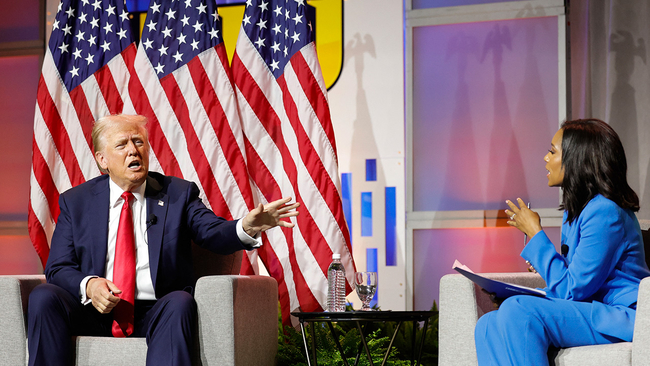CHICAGO, USA — Former President Donald Trump made controversial remarks about Vice President Kamala Harris’s racial identity during an interview at the National Association of Black Journalists, NABJ, Convention on Wednesday, July 31, 2024, sparking widespread backlash.
Speaking on stage at the convention, Trump claimed that Harris had shifted her racial identity.
“She was always of Indian heritage, and she was only promoting Indian heritage,” Trump said.
“I didn’t know she was Black until a number of years ago when she happened to turn Black. And now she wants to be known as Black. So I don’t know, is she Indian or is she Black?”
Trump’s remarks came after ABC News’ Rachel Scott pressed him on the GOP’s continued attacks on Harris as a “DEI hire” and his choice of Sen. J.D. Vance as his vice presidential pick.
Scott corrected Trump, noting that Harris had always identified as a Black woman and had attended Howard University, a Historically Black College.
The comments immediately drew condemnation.
White House Press Secretary Karine Jean-Pierre called Trump’s questioning “repulsive” and “insulting” during a press briefing. “Only she (Harris) can speak to her experience, only she can speak to what it’s like,” Jean-Pierre said. “She is the vice president of the United States and we have to put some respect on her name.”
Trump later doubled down on his statements via Truth Social, writing: “Crazy Kamala is saying she’s Indian, not Black. This is a big deal. Stone cold phony. She uses everybody, including her racial identity!”
The interview, intended to allow Trump to defend his record for Black Americans and outline his agenda for a second term, quickly turned contentious.
Trump spent over half an hour attacking Black journalists, the NABJ that hosted him, and Harris’s identity.
In a heated exchange with Scott, Trump deflected questions about his past racist rhetoric and attacks on Black journalists and attorneys.
“I don’t think I’ve ever been asked a question in such a horrible manner,” he told Scott, calling ABC News a “fake news network.” “I think it’s disgraceful.”
Trump also criticized the NABJ for technical issues that delayed the start of the interview, claiming he was invited under “false pretenses” and that he was misled into believing President Joe Biden or Vice President Kamala Harris would also attend.
Despite the confrontational tone, Trump defended his record, claiming, “I have been the best president for Black Americans since Abraham Lincoln,” which was met with laughter from the audience.
He reiterated his defense of the January 6 rioters, suggesting he would pardon them if they were innocent, despite their convictions.
Trump also stated his belief that migrants entering the country from the southern border were taking jobs from Black Americans and suggested that Harris would fail a cognitive test, a remark that added to the tension of the interview.
The conversation was cut short after approximately 30 minutes, despite being scheduled for an hour. Trump later claimed on Truth Social that he “crushed” the panel, despite the “rude and nasty” questions.

Jelani Cobb, Dean of the Columbia School of Journalism, criticised the format of the interview.
“The traditional objective of interviewing a candidate is to get clarification on their positions,” Cobb said. “And I was sceptical that it would happen—and it didn’t happen.”
Cobb also expressed disappointment that the session did not include a Q&A from the audience.
The interview, held in a meeting hall adjacent to the hotel’s grand ballroom, attracted nearly 1,000 attendees.
A small group of protesters gathered outside the venue, reflecting the contentious nature of Trump’s appearance.
NABJ officials defended the decision to invite Trump, citing a tradition of inviting presidential candidates during election years.
However, the decision faced scrutiny after reports emerged that the organization had rejected requests from Harris’s campaign for her to participate virtually or in person at a later date.
Reporters, including frequent Trump target April Ryan and columnist Karen Attiah, criticized the decision, with Attiah resigning from her post as convention co-chair in protest.
As the fallout from Trump’s remarks continues, the incident highlights the ongoing divisions and tensions in American politics, particularly around issues of race and identity.







